SDG 15 – Indicator 15.3.1 Sustainable use, conservation and restoration of land (policy)
PP No. 32 Tahun 2024
The government of the Republic of Indonesia has made regulations for Sriwijaya University in 2024 which state that state universities have legal status. These regulations discuss many things starting from the field of management and even including regulations on land use, conservation and restoration. Land use, conservation and restoration regulations can be seen in paragraph 3 of article 88.
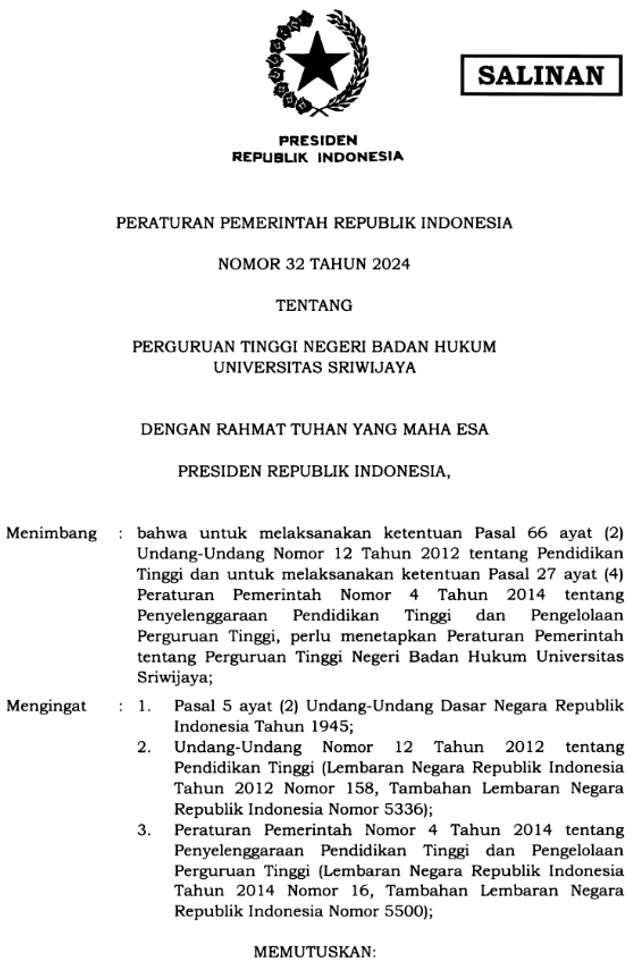
Link:
SDG 15 – Indicator 15.3.2 Monitoring IUCN and other conservation species (policies)
LAW ENFORCEMENT AGAINST CRIMINAL ACTS OF BUYING AND SELLING PROTECTED ANIMALS IN PALEMBANG CITY
As one of the state universities in Indonesia, Sriwijaya University always follows government regulations in various matters, including monitoring IUCN and maintaining diversity.
Sriwijaya University follows laws and regulations such as UU No. 5 of 1990, UU No. 41 of 1999, other regulations relating to environmental and ecosystem maintenance.
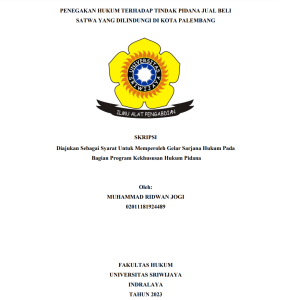
Link:
SDG 15 – Indicator 15.3.3 Local biodiversity included in planning and development
KSE UNSRI Ikut Bagian dalam Kegiatan Gerakan Penanaman 4000 Pohon Serentak di 40 Titik Se-Indonesia
Karya Salemba Empat (KSE) at Sriwijaya University (Unsri) participated in the nationwide “4000 Trees Planting Movement,” which took place at 40 locations across Indonesia. Unsri’s KSE chapter selected Sungsang IV Village, Banyuasin, as their site, where volunteers planted trees on Sunday, September 15, 2024.
The project collaborated with the Center for International Forestry Research (CIFOR) to manage mangroves, according to Herni Ernasari, the event coordinator and a student at Unsri’s Faculty of Mathematics and Natural Sciences. 150 mangrove seedlings were planted by volunteers, comprising 100 Rhizophora Apiculata propagules, 20 Bruguiera Gymnorrhiza, and 30 Rhizophora Apiculata seedlings. 47 KSE Unsri scholarship winners, 65 volunteers from six South Sumatran colleges, and representatives of the local government and environmental organizations participated in the event.
This program sought to increase students’ understanding of environmental issues while giving them real-world experience in collaboration and negotiation. Involving KSE and associated organizations, the initiative sought to raise community awareness of environmental preservation and expand the number of trees in Indonesia. Over 4,000 tree seedlings, including mangrove, fruit, and ornamental trees, were planted nationwide from Aceh to Papua as part of this program.
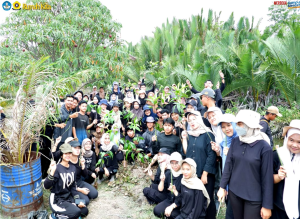
Link:
SDG 15 – Indicator 15.3.4 Alien species impact reduction (policies)
Pencegahan Wabah Corona Virus Disease (COVID-19) Di Lingkungan Universitas Sriwijaya
Sriwijaya University will still apply the same rules regarding handling alien species. This regulation is not only limited to the Covid-19 pandemic, but can also be used to handle other problems related to alien species.
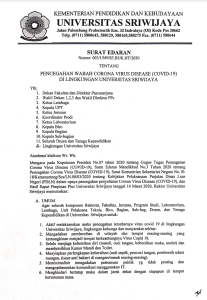
Link:
SDG 15 – Indicator 15.3.5 Collaboration for shared land ecosystems
WELFRAGE ECO: Welfare For Village Educate, Converse, Optimize From SriwijayaWelfrage, to Everyone
WELFRAGE ECO: Welfare For Village Educate, Converse, Optimize has the theme “Reduce Waste, Create a Bright Future”. This activity is a joint effort to increase public awareness of the importance of waste management and its impact on the future of our environment. This activity was held on Thursday, September 14 2024, at 14.00 WIB in Sungai Rasau Village, Pemulutan District, Ogan Ilir Regency, South Sumatra Province.
This activity collaborated with Youth Caring for a Beautiful and Clean Environment in South Sumatra (Pepelingasih), who were also present as speakers, namely, M Zacky Raimizard as Secretary of the Pepelingasih South Sumatra HR Development Div. and Kemas Muhammad Ilham M as Secretary of the Div. South Sumatra Pepelingasih Program and Development. This socialization includes material regarding “Eco-Enzyme Making Mechanisms”, an education on the use of organic waste, where fermentation produces enzymes that are useful for various household and environmental needs. And what’s interesting is that the presenters directly practice in front of the community.
The WELFRAGE ECO 3.0 program by IRRSA FISIP UNSRI, is one of the steps taken by IRSSA to realize one of the association’s visions, namely acting real and in line with the vision of FISIP UNSRI, namely FISIP UNSRI, namely Greeting, Caring and Sharing. This activity implements cleanliness, shows concern for the environment and surrounding communities, and shares with the community both material and knowledge.
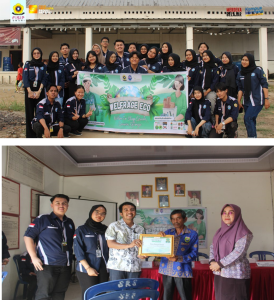
Link:
